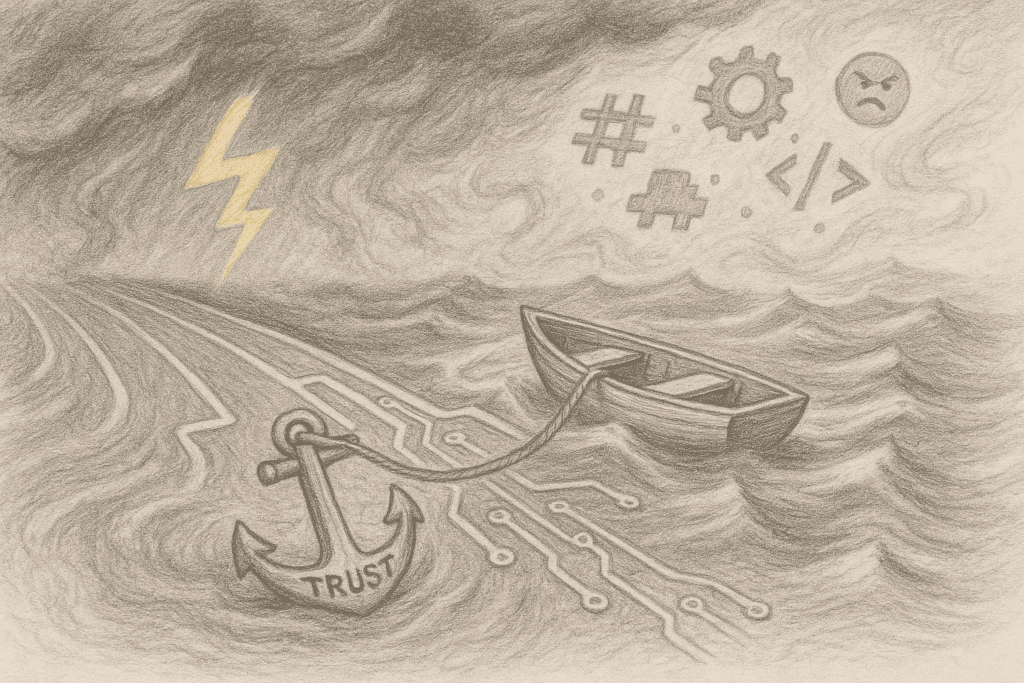There’s a particular kind of silence that falls when a room full of professionals watches AI do in thirty seconds what used to take their team three days. I’ve been in those rooms. Maybe you have too.
The anxiety is palpable, and it should be. We’re watching entire business models evaporate in real time. The rush to develop an AI-proof brand strategy has companies scrambling, but most are solving for the wrong problem. Your value was never just the output. It was never just the speed. It was the trust someone placed in you to understand what they couldn’t articulate. It was the judgment call you made when the data said one thing but your gut said another. It was knowing which rules to break and when.
That’s your brand. And it’s the only thing AI can’t replicate.
What Makes a Brand Truly AI-Proof?
An AI-proof brand strategy focuses on human trust, unique insights, and adaptability, qualities AI can’t replicate. By defining clearly why your brand matters beyond efficiency through methods like Augmented Branding, you secure its survival in the AI-driven marketplace.
Why AI Threatens Traditional Business Models

Here’s what’s happening: AI is systematically unbundling every business into its component parts. Customer service? Automated. Financial analysis? Generated. Content creation? Instantaneous. The functional layers that used to differentiate companies are being commoditized, one capability at a time.
The companies doubling down on incremental improvements are missing the point entirely. The teams adding more features to justify their existence are fighting the wrong battle. They’re trying to compete on efficiency with something designed to be perfectly efficient.
It’s like watching someone try to outrun electricity.According to MIT Sloan’s research on AI adoption, the companies succeeding with AI aren’t those protecting old models. They’re the ones reimagining how work gets done. Building an AI-proof brand isn’t about resistance; it’s about evolution.
Understanding the Real Value of Your Brand
When customers chose your company, what were they really buying? If you think it was the product features, the turnaround time, or even the price point, you’re about to learn a painful lesson.
They were buying your perspective. Your ability to solve problems they couldn’t quite name. Your track record of being there when things went sideways. They were buying the confidence that comes from working with people who understand their world.
Strip away all the functional benefits, and this is what remains: trust, perspective, and the peculiar alchemy of human understanding.
Survival Strategies in the AI Age

Companies are about to divide into two categories:
Category One: Those without a clear sense of why they exist beyond their current capabilities. They lack the strategic clarity to know which parts of their business to augment with AI and which to protect. They’re sitting on messy data, broken processes, and a culture that treats change like a threat instead of an opportunity. They’ll watch competitors integrate AI while they’re still debating whether it’s a fad.
Category Two: Those who know exactly what makes them irreplaceable. They have clean data, clear processes, and most importantly, a brand strong enough to transcend any single way of working. They see AI as a multiplier, not a replacement. They use it to strip away the mundane so humans can focus on what only humans can do.
The brutal truth? Most companies think they’re in Category Two, but they’re actually in Category One.
McKinsey’s analysis shows that only 8% of firms engage in core practices that support widespread AI adoption. The gap isn’t technological. It’s organizational. Protecting brand value from AI disruption starts with honest assessment of where you really stand.
How to Adapt and Thrive in the Great Unbundling
A brand that survives The Great Unbundling has three characteristics:
It knows its non-negotiable core. Not what you do, but why you matter. The companies that thrive will be those that can articulate exactly which human elements of their business create irreplaceable value. Then they’ll use AI to amplify everything else.
It’s built on strategic clarity, not tactical execution. The strongest brands aren’t afraid of AI making them faster or more efficient. They’re afraid of losing sight of why customers choose them in the first place. They know that AI can replicate tasks, but it can’t replicate the trust earned through years of showing up when it matters.
It adapts without losing its soul. If your brand is so rigid that integrating new technology threatens your identity, you’ve confused your methods with your mission. The companies that survive will be those whose brands are strong enough to evolve how they work while staying true to why they exist.
The Question That Changes Everything

Stop asking, “How do we compete with AI?” Start asking, “What becomes possible when we compete with AI?”
If your answer involves protecting old ways of working, hoarding information, or adding complexity to justify your existence, you’re already losing. But if your answer is about using AI to deliver on your brand promise better than ever before? Then you understand that this isn’t about human versus machine.
It’s about companies with clarity versus companies without it. It’s about brands strong enough to embrace new tools versus brands so fragile that any change threatens their existence.
The Path Forward
The Great Unbundling isn’t coming. It’s here. And it’s accelerating.
But this isn’t a story about loss. It’s a story about clarity. AI is forcing us to strip away everything artificial about our value propositions. What remains is the irreducible core of human insight, earned wisdom, and the relationships that make business human.
As Harvard Business Review’s research on AI and competitive advantage makes clear, the winners won’t be those who resist AI, but those who understand that brand differentiation in the AI era comes from amplifying what makes us uniquely human.
Build your brand on that foundation, and you’ll weather this storm. Build it on anything else, and you’re just waiting for someone to write the prompt that replaces you.
The choice, as always, is yours.
Amy is a brand strategist who helps leaders build companies that matter. She writes about the intersection of brand, culture, and what it means to build something lasting in an ephemeral world.
FAQ: Navigating Brand Strategy in an AI-Driven World
AI systematically unbundles businesses by automating their component parts, from customer service to financial analysis. The threat isn’t that AI works faster; it’s that it commoditizes the very capabilities many companies thought were their competitive advantage. When anyone can access the same AI tools, functional excellence becomes table stakes, not differentiation.
An AI-proof brand has three core elements: strategic clarity about why it exists beyond its capabilities, clean data and processes that allow AI integration rather than resistance, and the ability to evolve methods without losing mission. Instead of avoiding AI, focus on identifying the unique human contributions that provide irreplaceable value. Then, leverage AI to enhance all other aspects.
AI excels at pattern recognition and rapid execution, but it can’t replicate the human ability to navigate true ambiguity, make judgment calls when data conflicts with instinct, or understand unspoken context. Creativity alone may not be enough when everyone has access to the same AI-powered creative tools; the real question is whether AI’s creative abilities diminish the value of human creativity.
In a world where anyone can generate professional-looking content or analysis, trust becomes the ultimate differentiator. It’s built through years of showing up when things go wrong, making tough calls that prove right, and understanding what customers can’t articulate. AI can replicate your outputs, but it can’t replicate your track record.
